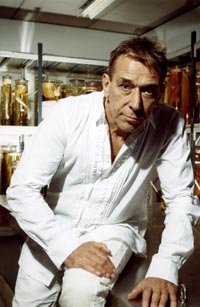

Interviews
Royalty in Repose
Interview by Dan Whitworth, transcribed from AXCESS magazine, 1994.
John Cale appears suddenly, darting on stage in slightly rumpled evening wear, a sheaf of laminated sheet music tucked under his arm. As he arranges himself at his white piano, he nods at the audience once and peers at the notes before him. My thoughts fade back ten years to the last time I saw Cale perform, a drunk and sloppy show punctuated by his frequent calls for more Corona.
Tonight, Cale is drinking bottled water-- a good sign, I think, but his distracted air has me worried. My fears soon prove unfounded. His first song, an adaptation of the Dylan Thomas poem "On a Wedding Anniversary", finds him focused on his music, singing with force and working the keys with his trademark fervor. When he switches to guitar to sing his paranoid 1975 classic "Leaving It Up To You", he begins to reveal traces of his former manic persona, his eyes darting back and forth as he channels his rich voice into the song's unwinding psychic frenzy. The audience is with him, bemused by his reserved but wry commentary between songs, drawn in by the depth of his performance. As he sings Leonard Cohen's "Hallelujah", a line from the song strikes me: like Cohen's David, Cale is a "baffled king", marked, perhaps, by the legendary abuses of his past, but still regal and undiminished. Bowing formally to the audience between encores, Cale smiles graciously, and thanks them for the generosity of their applause.
John Cale has played viola and piano since an early age. As a promising student at London University, he often chafed at the limitations of the classical hierarchy, and was drawn to the work of avant-garde composers like John Cage and LaMonte Young. When he moved to New York in 1963, he fell in with each of these influences in turn, eventually playing viola in Young's Theater of Eternal Music.
"That was my growing-up period," he recalls. "They were formative years." The next phase in Cale's career began when he met Lou Reed; after performing on street corners as a duo, they formed the nucleus of the Velvet Underground. "It was actually like going home," says Cale. "I mean, it was so much fun, all of a sudden. In Wales I'd wanted to have a band for a long time, but I'd never been able to pull it together with some jazz bands. Here was a golden opportunity to be able to do a rock and roll band-- which was even better than having a jazz band."
Cale applied his experiences in Young's band to his new rock group, creating the Velvet Underground's distinctive drone sound. "I also learned that when you hold a sustained open fifth for a long time, it gives you a lot of space, and it gives you a sense of space. I thought that here, maybe, was the opportunity to do something Phil Spectorish with the limited resources of a rock and roll band-- four people."
The rock and roll milieu gave Cale a chance to unleash the fierce improvisational skills that classical music had no use for. "Velvets shows were pretty riotous. When we went to the West Coast, we'd end up playing in big clubs with a lot of the acidhead bands, and we found we could fit in there by improvising a little harder than what the acidhead bands were doing."
Breaking away from the group after their second album [WHITE LIGHT/WHITE HEAT], Cale worked in production for a few years before returning with some subdued but elegant solo albums, including the 1973 classic PARIS 1919. Here he established his penchant for writing allusive, emotionally compelling songs linked to historical and political concerns-- a concern that would always mark such work as 1982's MUSIC FOR A NEW SOCIETY and the recent LAST DAY ON EARTH.
Cale sees no contradiction in linking the global with the intimate in this fashion. "Emotional concerns *are* very political, in the end," he points out.
The mid-70s found Cale in front of a series of rock bands, assaulting audiences with a stage presentation that drew as much from the Theatre of Cruelty as from Phil Spector. His extreme behavior contributed to his wild man reputation, but it never obscured the quality of his work. His albums are varied and eclectic, but they are unified by the originality of his concepts. Eventually, Cale took a break after the release of his 1985 album ARTIFICIAL INTELLIGENCE, perhaps inspired by the birth of his daughter Eden. When he re-emerged four years later it was with renewed energy, an energy which has so far produced several classical albums, a collaboration with Brian Eno, another with Lou Reed, and the much-heralded Velvet Underground reunion.
His latest album, LAST DAY ON EARTH, was co-written with Bob Neuwirth. Conceived several years ago, the album is a "blueprint for theater" that features a cast of characters concerned, once more, with the convergence of political and emotional matters. Cale admits that an actual full scale performance won't take place for quite some time. "We really have to write a book for the stage production. The collection of songs has many different facets to the piece. I mean, you can write three different versions of the piece. It depends on which one you want to write. Do you want to write a love story, do you want to write a political tract, do you want to just write a drama? We haven't really approached that problem yet."{AXS}
Interviewer's notes: LAST DAY ON EARTH is currently available on MCA records. SEDUCING DOWN THE DOOR, a two-CD career retrospective, and MUSIC FOR A NEW SOCIETY are available from Rhino Record; Warner Brothers has reissued PARIS 1919 and Cale's 1972 instrumental album THE ACADEMY IN PERIL. And don't forget-- any reputable used record store should have FEAR and other Cale classics on vinyl.